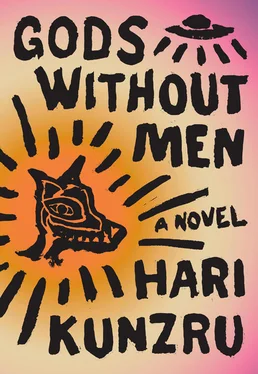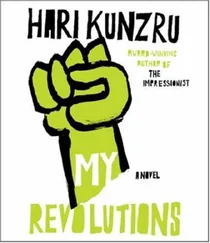It was the San Bernardino County Sheriff’s office. Raj had been found. Alive.
He tried to process the information. His son was safe. A little dehydrated, but apart from that … No, they couldn’t say right now where he’d been. Out in the desert. On military land. Yes, he’d understood correctly. No, they didn’t know why. Of course, he heard himself say. I’ll leave now. I don’t know how long. Soon as possible. I’ll let you know when I have an exact time. He ended the call and phoned Lisa. She sobbed incoherently. Thank God, she kept saying. Thank God, who has answered my prayers.
He checked out of the hotel and took a taxi to JFK. As they went into the Midtown Tunnel he was gripped by a sudden powerful anxiety. He’d misunderstood. This was just wish fulfillment; it couldn’t be real. As soon as he could get a signal again, he phoned the sheriff’s office. In the background he could hear what sounded like a party. “You’ll have to speak up, Mr. Matharu,” said the deputy sheriff, in the tone of a man whose back had lately been slapped a lot. “We got a bunch of folks here. Everyone’s come in to celebrate.”
“So you found him.”
“Yes, sir, we did.”
“And he’s alive?”
“Like I said. Safe and sound. He’s a tough little guy, your son.”
“I know you told me already, but — could you say it again? Just go through what happened?”
The sheriff repeated the details. Raj had been found on a Marine base in the middle of an exercise. No one could work out how he’d got there. He was ten miles from the nearest public road. The kidnapper must have dumped him, though why he chose that spot and how he got a car there were complete mysteries. The Marine Corps perimeter security was considered state-of-the-art. Heat sensors, motion sensors, aerial surveillance: the whole nine yards.
At JFK he bought a ticket for Las Vegas. At the gate he paced up and down, unable to sit still. The ground staff hand-searched him twice, suspicious that he was traveling without luggage. The flight seemed interminable. Around him people read or watched movies. He sat and listened to the rumble of the engine, willing the pilot to fly faster. A police driver was waiting for him at McCarran, a young man with a wispy mustache and a misspelled sign. They drove down I-15, the evening sunlight turning the desert a dazzling orange-gold. He phoned Lisa to find out the news.
“Are you there?”
She was sobbing. “Yes. Yes, I am.”
“Is he OK?”
“He’s back, Jaz. He’s really back.”
They drove on. The gold land was triumphant, a revelation of glory.
The media were waiting outside the office, the familiar mob scene — reporters taking calls in the parking lot, television lights on ten-foot stands. When he got out of the car they surged forward with mikes and cameras, calling out his name. “How does it feel, Jaz? How does it feel?” The driver hustled him through the doors and into the quiet of the lobby.
His hand was shaken by smiling uniformed men, who ushered him into some kind of conference room. A long table, plastic-backed chairs, fading public-information posters on the walls and, at the far end, Raj, sitting on Lisa’s lap. As Jaz came into the room, the little boy looked up and smiled. Together they looked like some religious image, Yashoda and Krishna, Madonna and child. Jaz fell on his knees and embraced them both. He felt his son’s hot damp breath on his cheek, smelled his hair, the soft skin of his face. He was real. It was actually happening. He exhaled and the air came out of him in a long stream, like a balloon deflating. Lisa’s hand rubbed a soothing circle on his back as he cried.
Two days later, when they boarded a plane for New York, the other passengers applauded, peering into the aisles to get a glimpse of them. For the next week the storm of publicity was even more intense than when Raj disappeared. The Matharu family was now a great American story of triumph over tragedy. They were inspirational. Everyone wanted to get close to them, to warm their hearts over the sentimental fire. Though they were offered huge amounts of money to tell their story, they declined every interview. “All I want,” said Lisa to a particularly pushy reporter who’d followed her into the women’s bathroom at JFK, “is for all the people who wrote such lies about us to have the decency to apologize.” Of course none of them did.
For a while, denied access to the central characters, the media made do with the supporting players. They made much out of the young Iraqi girl who’d found Raj. She was interviewed on evening talk shows. Everyone found her delightful. She was generally agreed to be the right kind of immigrant, a credit to America. More than one commentator quoted Emma Lazarus on the poor and huddled masses yearning to breathe free; an anonymous benefactor even offered to pay her college tuition. The British rock star Nicky Capaldi made a mumbling appearance on the BBC, sporting a mountain-man beard and singing an incoherent song called “the boy on the burning sands.” He “identified with Raj,” he told the interviewer. “In a lot of ways, the boy on the sands is me.”
After a man claiming to be a film producer called his cell, asking whether he could buy the family’s life rights for a film, Jaz switched off his phone. He no longer felt the need to follow what the world was saying. He wanted to be private again. One by one, their friends phoned to congratulate them. There were some awkward conversations, as people who’d not spoken to them in months, and who’d obviously thought the worst, tried to establish the fiction that they’d been loyal and supportive all along. The only person Jaz was really happy to hear from was Amy. He and Lisa Skyped with her, holding up Raj to the webcam so she could see his face. She cried and reached out toward the screen, as if for a moment she thought she’d be able to touch him.
They didn’t go out much, preferring to stay at home, ordering in food and watching the maple outside the front window shed its leaves. Sometimes they’d take walks in Prospect Park, the three of them hand in hand, bundled up against the wind, sunk in a silence that was both companionable and eerie, as if a spell had been cast and sound had been snatched away. Sometimes Jaz would try to start a conversation, pointing out familiar things as if they were exotic and new, but he kept coming back to the conclusion that there was nothing to talk about, that somehow the months of pain and separation had exhausted words. Frequently he or Lisa would begin to cry. It would break out without warning. He’d be watching her fold laundry, red-eyed, then turn back to his book, only to find its pages were damp to the touch.
The wider world moved on from their strange little story. There was a presidential election to think about, and their neighbors were imagining change they could believe in, canvassing and putting up posters. For a while, their lives acquired a thin membrane of normality, like a scab. Then another jolt of weirdness tore it back open. Jaz had been watching the financial crisis as if through the wrong end of a telescope; events that a few months previously would have dominated his life — the collapse of Lehman Brothers, the plummeting Dow — seemed to be taking place in an alternate reality, unconnected to his. He didn’t go online to check his own portfolio, though he knew it must be taking a huge hit. Let it all go to hell, he thought. All those giant abstractions, the gambles on thin air. Here were the falling leaves, the smell of his son’s skin. With his severance package, he wouldn’t need to look for work for at least a year — longer if the family lived frugally. He wondered whether the Walter model had predicted the chaos. If Cy and Fenton were still making money in the midst of the carnage, they’d be hailed as heroes. Fenton’s ego would be completely out of control.
Читать дальше












